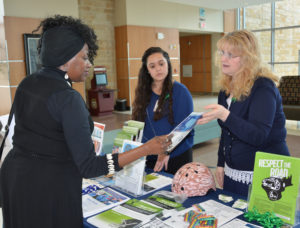by Gloria Montgomery, CRDAMC Public Affairs
FORT HOOD, Texas—Carl R. Darnall Army Medical Center kicked off March’s Brain Injury Awareness month Friday with an information booth on traumatic brain injuries (TBI), the signature injury of current conflicts.
This year’s theme is Advancing Warfighter Brain Health that supports the enduring responsibility of DoD to promote and protect the health and well-being of the nation’s warfighters and their families.
“Only by amplifying our communications about, and promoting awareness of warfighter brain health and surveillance initiatives, can the department eliminate, once and for all, the stigma that remains attached to help-seeking behaviors,” said Deputy Secretary of Defense Patrick Shanahan in a memo dated Oct. 1, 2018, that outlines a strategy and action plan to support warfighter brain health. Shanahan stated.
Through the Defense and Veterans Brain Injury Center, a division of the Defense Health Agency Research and Development Directorate and the TBI center of excellence for the Defense Department, the department is leveraging new technologies and cutting-edge research to develop concussion care tools and protocols that prioritize early identification and individualized treatment to maximize warfighter brain health.
According to DVBIC, 383,947 service members received a TBI diagnosis from 2000 until the first quarter of 2018. The most common form of TBI in the military is mild TBI, also referred to as concussion. Common symptoms following a concussion include headaches, dizziness, sleep disturbances, vision changes, balance problems, fatigue, attention and memory problems, irritability, and mood changes. Early detection of traumatic brain injury leads to early treatment; early treatment leads to better outcomes.
“Educating our service members and families to recognize the signs and symptoms indicative of TBI and making it easy for families, loved ones, and friends to seek and receive the information and support they need to respond compassionately and constructively to a member who may have sustained a TBI, are essential first steps,” wrote Shanahan.
The month-long awareness focus on brain injury will highlight ongoing research and breakthroughs that help improve and maintain the quality of life for those living with a brain injury.
One of those initiatives is the recent release of new cutting-edge provider tools, such as the updated Military Acute Concussion Evaluation, or MACE 2. This month, CRDAMC providers will begin training on the new screening tool that will allow frontline providers to quickly screen for concussion.
At noon on March 12, DVBIC will hold a Facebook town hall featuring Navy Capt. Scott Pyne, DVBIC division chief and former head team physician for U.S. Naval Academy athletics.
In addition, A Head for the Future, a DVBIC TBI awareness initiative, will feature a video social media campaign to share real stories of service members, veterans, family members, providers, and advocates in the military TBI community. The stories – captured through user-generated videos or Skype interviews – share how people cope with TBI, as well as the people who support them – including DVBIC and DHA staff who work to improve their lives.
In addition, A Head for the Future, a DVBIC TBI awareness initiative, will feature a video social media campaign to share real stories of service members, veterans, family members, providers, and advocates in the military TBI community. The stories – captured through user-generated videos or Skype interviews – share how people cope with TBI, as well as the people who support them – including DVBIC and DHA staff who work to improve their lives. Learn more about A Head for the Future on their website.
On March 22, Fort Hood Intrepid Spirit Center will hold its annual Brain Injury Awareness Month Open House. The ISC provides a comprehensive, multidisciplinary and holistic approach to treating Soldiers with TBI, PTSD and other conditions. The center brings together doctors, nurse case managers, as well as therapists, social workers and psychologists who focus on Soldier recovery and, ultimately, a return to duty.

